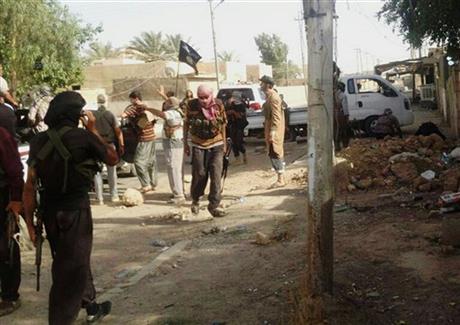
By RYAN LUCAS
Militias of the al-Qaida breakaway group Islamic State of Iraq and the Levant (ISIL) deploy in an area in Tikrit, 80 miles (130 kilometers) north of Baghdad, Iraq, Wednesday, June 11, 2014. Al-Qaida-inspired militants seized effective control Wednesday of Saddam Hussein’s hometown of Tikrit, expanding their offensive closer to the Iraqi capital as soldiers and security forces abandoned their posts following clashes with the insurgents. (AP Photo)
Mideast Iraq
Fighters of the al-Qaida breakaway group Islamic State of Iraq and the Levant (ISIL) burn an armored vehicle belonging to the Iraqi army in Tikrit, 80 miles (130 kilometers) north of Baghdad, Iraq, Wednesday, June 11, 2014. Al-Qaida-inspired militants seized effective control Wednesday of Saddam Hussein’s hometown of Tikrit, expanding their offensive closer to the Iraqi capital as soldiers and security forces abandoned their posts following clashes with the insurgents. (AP Photo)
Prev
1 of 2
Next
BEIRUT (AP) — An al-Qaida splinter group that has seized a huge chunk of northern Iraq commands as many as 10,000 fighters and has steadily been consolidating its hold on much of northeastern Syria across the border.
Its pursuit of an Islamic state that would straddle the two countries has thrown it into bloody conflict with both governments, Kurdish militias and Syrian rebels of all stripes. The group, known as the Islamic State of Iraq and the Levant, has employed a calculated strategy to achieve its aims, using everything from beheadings to terrify opponents to ice cream socials for children to curry favor with local populations under its control.
But it is the group’s military prowess that has brought under its sway a swath of territory that stretches from the Syrian-Turkish frontier in the north down the Euphrates River all the way to the Iraqi city of Fallujah just 65 kilometers (40 miles) west of Baghdad.
This week, the group’s fighters, many of them in fast-moving pickup trucks mounted with machine guns, captured Iraq’s second-largest city, Mosul, before barreling south to take the city of Tikrit — two urban centers in the heartland of northern Iraq’s oil industry.
It commands between 7,000 and 10,000 fighters, according to U.S. intelligence officials who spoke on condition of anonymity because they weren’t authorized to brief the media.
The Islamic State is the latest and most powerful incarnation of what began as an al-Qaida affiliate in Iraq following the 2003 U.S.-led invasion. American forces spent years and enormous resources to bring the group largely to heel before U.S. troops pulled out of the country in December of 2011.
Since then, the region has been convulsed in political turmoil and sectarian hatreds. The Islamic State has seized on those Sunni-Shiite tensions to help whip up its Sunni extremist followers.
The group is led by an ambitious Iraqi militant known by his nom de guerre of Abu Bakr al-Baghdadi with a $10 million U.S. bounty on his head. After taking the reins in 2010, al-Baghdadi successfully transformed what had been an umbrella organization focused mainly on Iraq into a transnational military force.
The Syrian uprising, which began in 2011, opened the door to his greater ambitions. Al-Baghdadi dispatched militants to Syria to set up a group called the Nusra Front.
Initially, more moderate Syrian rebels welcomed the group’s experienced fighters. But the Islamic State alienated many rebels and Syrian civilians alike with its brutality and attempts to impose its strict interpretation of Islam.
Eventually, the Islamic State’s presence in Syria proved so destabilizing that it fell out with the Nusra Front. Their mutual patron at the time, al-Qaida leader Ayman al-Zawahri, formally disavowed the Islamic State in February.
Other Syrian rebel factions were waging an offensive against the Islamic State. Activists say that fighting, which is still going on, has killed more than 6,000 people.
Al-Baghdadi’s group now controls much of northern and eastern Syria from its stronghold of Raqqa, where its strict brand of Islamic law holds sway. Activists and residents say music has been banned, Christians have to pay an Islamic tax for protection and people are executed in the main square.
In the Iraqi city of Fallujah, however, residents say the group has so far taken a more moderate approach, choosing to overlook some practices it considers forbidden.
___
Associated Press writers Diaa Hadid and Sam Kimball in Beirut, Ken Dilanian in Washington and Adam Schreck in Dubai contributed to this report.


